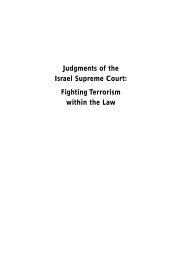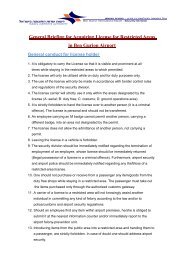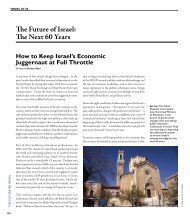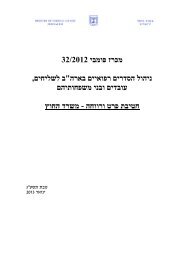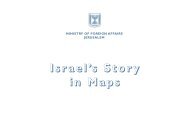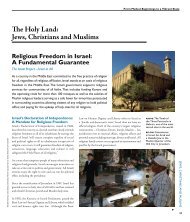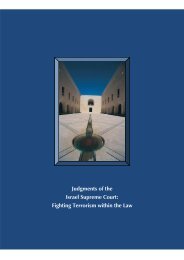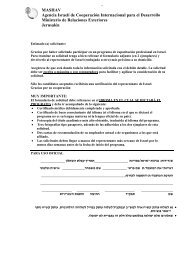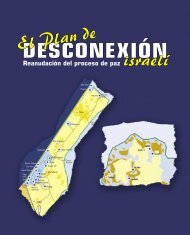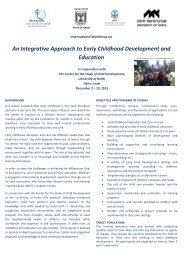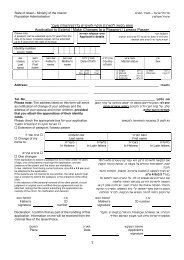Judgments of the Israel Supreme Court: Fighting Terrorism within ...
Judgments of the Israel Supreme Court: Fighting Terrorism within ...
Judgments of the Israel Supreme Court: Fighting Terrorism within ...
Create successful ePaper yourself
Turn your PDF publications into a flip-book with our unique Google optimized e-Paper software.
first court to address <strong>the</strong> case, and it is not a court <strong>of</strong> appeal. The High <strong>Court</strong><br />
<strong>of</strong> Justice is also <strong>the</strong> last instance. There is no appeal on <strong>the</strong> <strong>Court</strong>'s rulings, as<br />
it is <strong>the</strong> highest judicial instance in <strong>Israel</strong>.<br />
Usually <strong>the</strong> panel is composed <strong>of</strong> three justices, but for petitions <strong>of</strong><br />
particular importance, a larger panel with an odd number <strong>of</strong> justices may<br />
preside (to date, up to 15). The High <strong>Court</strong> <strong>of</strong> Justice need not adjudicate<br />
every dispute brought before it. It has <strong>the</strong> discretion to establish locus standi<br />
(who have <strong>the</strong> right to initiate a proceeding) and to decide whe<strong>the</strong>r a dispute<br />
is justiciable (if it is an appropriate case for <strong>the</strong> <strong>Court</strong> to address). Over <strong>the</strong><br />
years <strong>the</strong> <strong>Court</strong> has demonstrated a flexible approach regarding locus standi<br />
and justiciable doctrines. It has been willing to hear petitions brought by<br />
public organizations with no personal interests in <strong>the</strong> dispute which clearly set<br />
out <strong>the</strong> principle issues <strong>of</strong> <strong>the</strong> dispute. The <strong>Court</strong> has also frequently shown<br />
readiness to adjudicate military and security cases. This flexibility forms <strong>the</strong><br />
basis for <strong>the</strong> numerous judicial decisions <strong>of</strong> <strong>the</strong> <strong>Court</strong> centering on <strong>the</strong> war on<br />
terror.<br />
The High <strong>Court</strong> <strong>of</strong> Justice is ever busy adjudicating petitions lodged against<br />
public bodies operating in <strong>the</strong> State <strong>of</strong> <strong>Israel</strong>. In addition, it hears petitions by<br />
residents <strong>of</strong> <strong>the</strong> West Bank and Gaza Strip brought against <strong>the</strong> activities <strong>of</strong><br />
<strong>the</strong> <strong>Israel</strong> Defense Forces and o<strong>the</strong>r security bodies in <strong>the</strong>se areas, as well as<br />
petitions brought by public organizations (with no personal interests) against<br />
<strong>the</strong>se operations. The <strong>Court</strong>'s authority to preside over <strong>the</strong>se cases stems from<br />
<strong>the</strong> view that <strong>the</strong> security forces operating in <strong>the</strong> West Bank and Gaza Strip<br />
are also public bodies which are subject to <strong>the</strong> law. This policy, which was<br />
crystallized after <strong>the</strong> Six Day War <strong>of</strong> 1967, allows Palestinian residents to<br />
petition <strong>the</strong> <strong>Israel</strong>i <strong>Supreme</strong> <strong>Court</strong> and subjects <strong>the</strong> operations <strong>of</strong> <strong>Israel</strong> in <strong>the</strong><br />
territories to judicial review. Most <strong>of</strong> <strong>the</strong> judgments presented in this booklet<br />
are an expression <strong>of</strong> this judicial review.<br />
6




